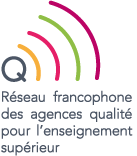On 18th May 2017, the cooperation between the Agence Universitaire de la Francophonie (AUF) and the Commission des Titres d’Ingénieur (CTI) was confirmed by the signing of a framework partnership agreement between the rector of the AUF, Jean-Paul de Gaudemar, and the president of the CTI, Laurent Mahieu.
The two organisations have agreed to develop their cooperation in favour of French-speaking higher education institutions and courses, in particular through the sharing of information, exchanges of experts, the organisation of events, and support for the creation and strengthening of quality assurance and accreditation in French-speaking developing countries.
This partnership should contribute to the influence of the French-speaking world and enable French engineering schools to strengthen their internationalisation and that of their students. For the AUF and the CTI, the aim is to make a general contribution to “a global and local development” through an “active solidarity”.
As part of its partnership with the AUF, the CTI, represented by its President Laurent Mahieu, was invited to attend its 17th General Assembly in Marrakech from 10th to 12th May 2017. This assembly is held every 4 years, in particular to define the four-year strategy of this unique network.
Among the three challenges to be met and the nine strategic areas identified by the AUF, the CTI is particularly interested in the quality, employability and professional integration of graduates, and in universities as agents of the global and local development.
This event was also an opportunity to meet and work with key players in the French-speaking world in North Africa and sub-Saharian Africa.
The challenge of quality assurance is part of the AUF’s strategy under axis 1 “Contribute to ensuring quality in the field of training” and axis 3 “Contribute to the implementation of governance adapted to the new challenges”. At the intersection of these two axes, the aim is to “contribute to the establishment of French-language university accreditation and quality assurance systems in the field of education”. The CTI is delighted that the FrAQ-Sup francophone network, co-founded by the CTI, was mentioned by the AUF rector in his presentation speech.
The second challenge, which concerns the employability and professional integration of graduates, is at the heart of the CTI’s accreditation approach, including with a view to the recognition (“Admission par l’Etat”) of foreign degrees in France.
Finally, the third challenge aims to promote the role of universities as operators in the global and local development. This reflects an ambitious political vision of the role of higher education institutions, and underlines in particular the need to help strengthen the international dimension of member institutions (axis 9). As Michaëlle Jean, Secretary General of La Francophonie, has pointed out, education is “a weapon of massive construction”.
The Rector’s stated aim in these nine areas of work is to build active solidarity between universities as part of an open Francophonie, and to avoid widespread competition between institutions. The aim is also to move from a “resources agency” to a “development agency”.
Beyond the formal meetings, the General Assembly enabled an immersion of the CTI through its president in the French-speaking world of universities and furthered the dialogue at many levels.
The event confirmed that French engineering schools have an important role to play in strengthening their internationalisation and that of their students, and in contributing to “global and local development” through “active solidarity”.

